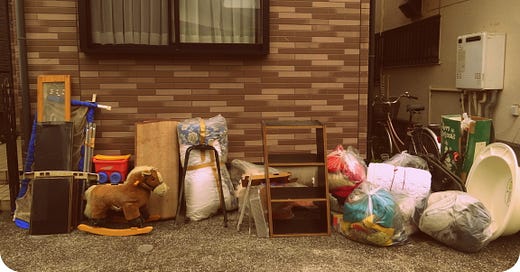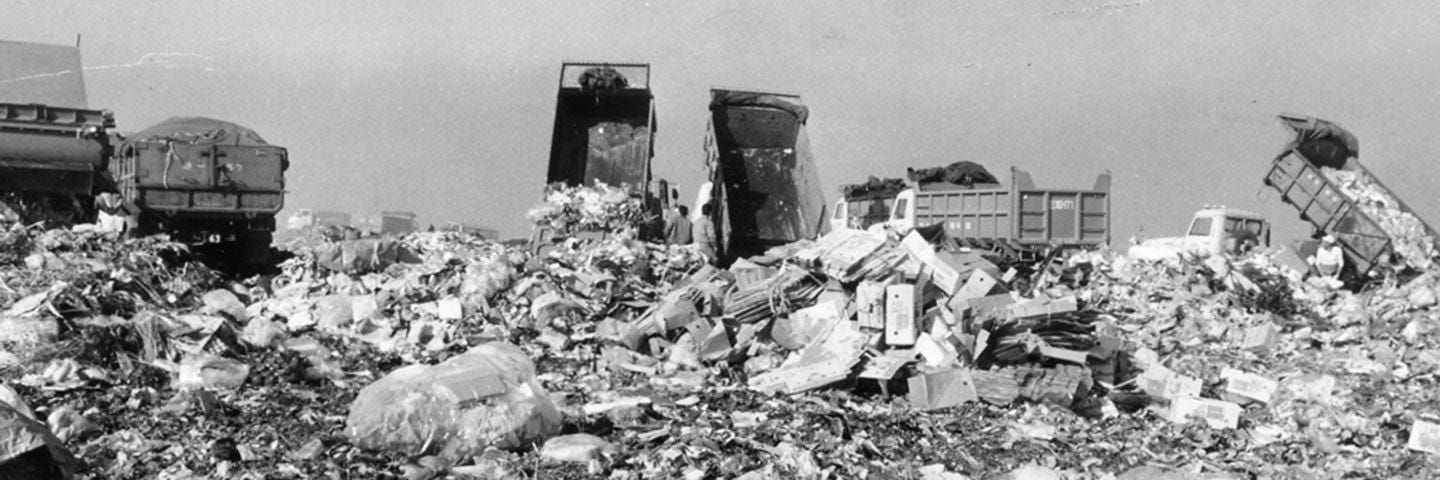Junk Paradise Lost
Dear readers, a few days ago I posted a story about rubbish. That got me thinking about Japan’s long and fascinating relationship with trash, and my futile attempts at rescuing furniture from the street (fade out)
The other day I found a 1.5-meter-high wooden cabinet in the street near my house. It was beautiful, apparently in good enough conditions, and I soon figured out all the things I could cram into it. But first I had to ask permission to drag it home to my boss (i.e. my beloved wife) and predictably she said no.
You see, my wife is Japanese, and like many other people in this country, she is enamored with things new. Only once I managed to convince her to let into our house a second-hand piece of furniture, and she went so far as to polish the cabinet I had scavenged so at least it would look half decent. Too bad, because Japan is trash-picking paradise… or maybe I should say, it used to be.
I come from Italy, and in my country I’ve nearly never seen good stuff in the trash to pick up. In Italy, dumpster diving is a virtually unheard-of practice, unless you are really poor. So when I came to Japan for the first time, back in 1989, I was thrilled to hear hard-to-believe stories of people who not only were throwing away any kind of furniture, but still working stereos, electric fans and air conditioners, and then bicycles big and small, plants, you name it.
Wild and unchecked spending and investments at the corporate level characterized the ‘80s, now infamously known as the “bubble economy” era. Living standards also reached a level where people could finally spend their hard-earned money without worrying too much about the future.
Public demand for consumer goods skyrocketed to new highs, and the fad- and trend-crazy Japanese went on a seemingly endless shopping spree. As soon as a new model was in the stores, the “old one” was unceremoniously kicked out of the house.
Japanese manufacturers fueled this lust for buying by bringing out new products in a steady stream, and in no time the market was flooded with shin’hatsubai (“newly on sale” products).
Japanese importers began scouring the world for new, novelty-type items. According to marketing specialists, any manufacturer or importer who introduced a new product and promoted it nationally could expect to sell close to half a million units to impulse buyers. Hundreds of these new products were born and hundreds died within a matter of months.
The early ‘80s-to-early ‘90s were, among other things, the years in which the city of Tokyo recycled millions of tons of trash by dumping them into Tokyo Bay, in order to reclaim a part of the sea and create a number of artificial islands. By far the most famous of those giant dumps was Yumenoshima (Dream Island). The more intrepid people would go there with their pick-up trucks and gather a real treasure.
The first time I came to Japan, back in 1989, my girlfriend’s brother told me all kinds of stories. One of his friends, for instance, once found a nearly new and perfectly working 500cc Honda. Other people became rich by rescuing slightly broken appliances, fixing and re-selling them to less picky customers. One of these entrepreneurs was a homeless man who went on to open 230 stores nationwide in franchise and gross annual revenues equivalent to U.S. $100 million. He even wrote a couple of books on how to be a successful businessman.
I came back to Japan in 1992. By that time, the bubble had burst, many companies had gone bankrupt, several people had committed suicide, and the Japanese had re-discovered the advantages of keeping their stuff at home. So I neither managed to furnish my apartment with junk nor became rich, but I still managed to find something.
Maybe I should have been less lazy. Some people here (yes, even the rule-loving, law-abiding Japanese) put their big-sized trash out late at night, mainly because it costs money to have them taken away by city or ward officials (you need to buy stickers from your local convenient store and call the city office so they come to your area to pick it up) and not everybody is willing to spend $5 to get rid of a desk. So the real trash seekers wake up in the middle of the night and go hunting while everybody is sleeping.
Nowadays the only things one can be sure to find in the streets on a regular basis are books and magazines. For example, in the area where I live, Saturdays are devoted to collecting paper trash. In this respect, the Japanese are ideal citizens, because they diligently separate newspapers and books/magazines, and neatly bound them with thin ropes. This way, it’s easy to find something that might be of your interest. I don’t really like to read in Japanese (those damn Chinese characters…), but once in a while I manage to find an old book with great pictures, or other material that I can use for my collages.
If you are thinking about upgrading to a paid subscription, here’s your chance to get a few free books in the process.





